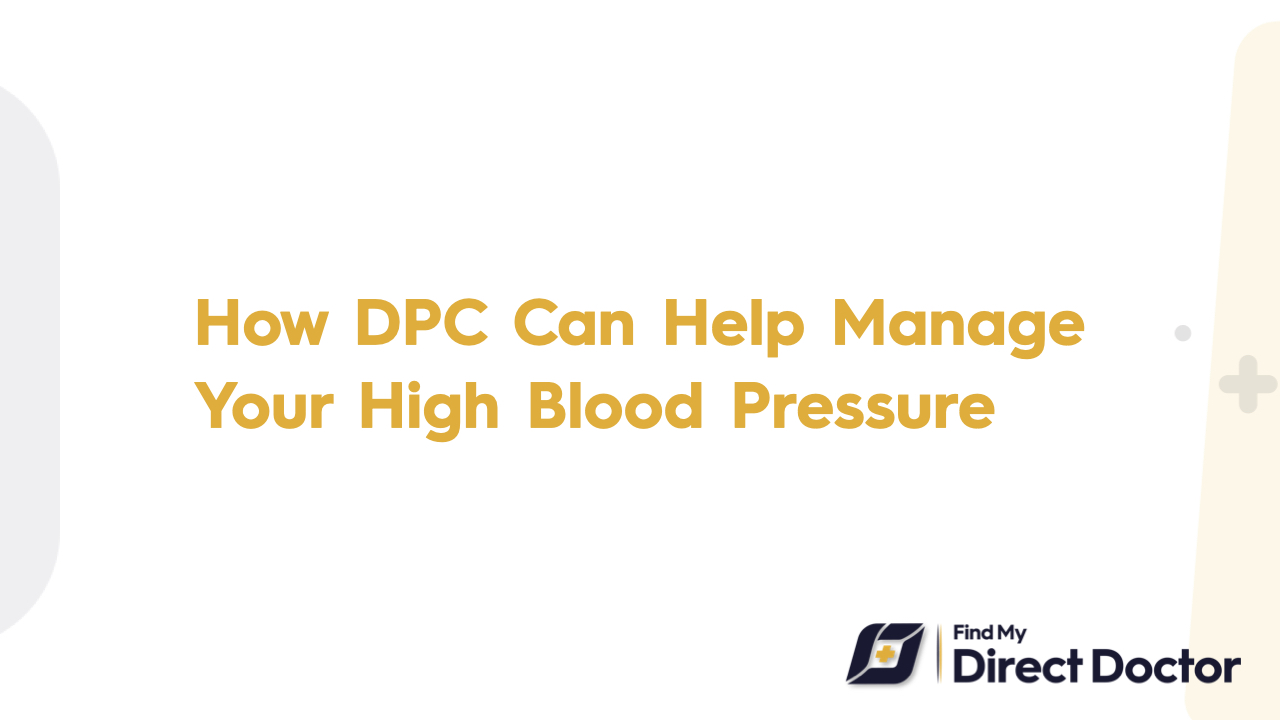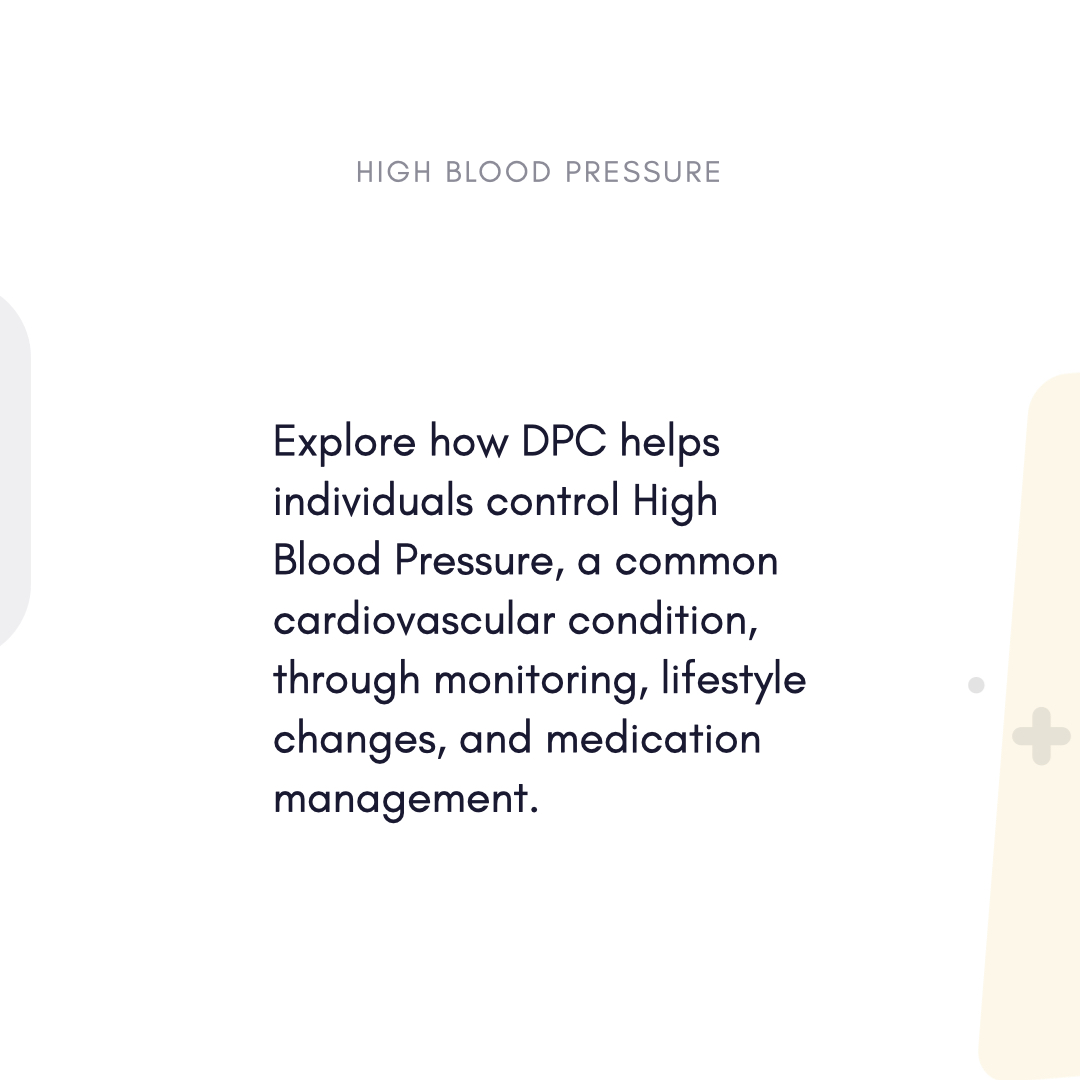High Blood Pressure and Direct Primary Care (DPC): Your Path to Personalized, Effective Control
You know how taxing it can be if you have been advised your blood pressure is rising or if you already have hypertension. Although less than half of American adults have their blood pressure under control, almost one in three have high blood pressure. Ignored, it silently compromises kidneys, arteries, and the heart. Good news is that Direct Primary Care (DPC) provides a proactive, reasonably priced approach to control hypertension that gives your needs top priority rather than insurance red tape. Allow me to investigate how.

Gaining Knowledge of High Blood Pressure
- Definition: When the force of blood against artery walls is constantly too high, one develops high blood pressure—hypertension. Often referred to as the "silent killer," it seldom causes symptoms until significant damage results.
- Important hazards of untreated hypertension:
- Heart failure, stroke, or a heart attack.
- Renal illness.
- Vision fading.
- Cognitive fall-off.
- Prevention: Preventing complications depends mostly on early identification and regular management.
DPC Revolutionizes Hypertension Management
Typically costing USD 50–USD 150, Direct Primary Care (DPC) is a membership-based model whereby patients pay a monthly fee directly to their doctor, so avoiding insurance. Key for controlling chronic diseases like hypertension, this model stresses personalized care, unlimited access, and cost transparency.
1. Customized Approach Based on Experience
- DPC doctors give a patient-centered, team-based approach matched with American Heart Association and American College of Cardiology guidelines top priority. Individuals:
- Look at root causes—genetics, diet, stress, or sleep apnea.
- Create tailored plans combining:
- Customized diet plans (e.g., DASH diet), exercise regimens, and stress-reducing strategies are among lifestyle strategies.
- Prescription writing for reasonably priced generics (such lisinopral, amlodipine) and dose changes depending on home monitoring.
- Focusing on comorbidities like diabetes or obesity that aggravate hypertension.
- Work with experts (cardiologists, dietitians) to guarantee thorough treatment.
2. Reasonably Priced, Open Testing and Treatment Options
- Using wholesale-priced drugs (e.g., USD 4/month for hydrochlorothiazide), DPC clinics cut costs.
- Discount lab panels (such kidney function tests, lipid profiles) and in-office blood pressure monitoring.
- Preventive emphasis helps to avoid expensive ER trips for crises of hypertension. Studies show DPC models save patients thousands yearly when compared to conventional fee-for-service treatment.
3. Ongoing Help for Long-Term Results
- Having 24/7 access to your doctor allows you to rapidly change meds should readings surge.
- Using shared blood pressure logs, track development.
- Get mental health tools to help you control stress, a main factor causing hypertension.
Individualized Control of Hypertension in DPC
- One-size-fits-not is the nature of hypertension. DPC is quite good at creating precision treatment:
- Early intervention: Frequent visits help to spot trends before organ damage starts.
- Examining sleep quality, alcohol intake, or salt sensitivity holistically.
- Tech integration: Suggesting real-time tracking validated home blood pressure monitors or apps.
Real-World Success Stories
- Case 1: For ten years Sarah, 45, battled hypertension. Her former physician wrote lisinopral but never mentioned her high-sodium diet or demanding job schedule. Her DPC doctor ordered a kidney function test, spent an hour going over her lifestyle, and developed a plan combining a low-sodium DASH diet, mindfulness exercises, and a slow rise in exercise. Without changing her medication dose, Sarah's blood pressure dropped from 160/100 to 130/85 within three months.
- Case 2: Despite a family history of kidney disease, James, 58, avoided regular bloodwork for years out of financial considerations. Affordable labs offered by his DPC clinic revealed early indicators of kidney strain connected to his hypertension. To cut processed foods, his doctor changed his meds, included a diuretic, and linked him with a nutritionist. James's kidney performance steadied and his blood pressure is now regularly below 140/90.
FAQs on DPC and High Blood Pressure
- Q: Is a cure for hypertension possible?
A: Although it's usually lifetime, many find control with medication and lifestyle changes. DPC guides you in striking the proper mix.
- Q: For chronic conditions, is DPC worth the expense?
A: Perfectly true. Most patients save by cutting out ER visits, inflated drug costs, and co-pays. Generally speaking, DPC membership is less expensive than a gym membership.
- Q: What should I do if I need a cardiologist?
A: Your DPC doctor arranges referrals and usually works out echocardiogram or stress test cash-pay rates.
Why DPC Works for Hypertension Patients
- Guideline Backing: Leading medical societies like the American College of Physicians emphasize how direct patient-provider relationships help raise the quality of treatment.
- Insurer-Free Care: DPC enables:
- Faster corrections: BP surge same-day visits.
- Regular monitoring and customized plans to increase treatment compliance.
- Preventive focus: Cost and open pricing help to lower long-term costs.
How DPC Specifically Helps Hypertension Patients
- Accessibility: Same-day visits and 24/7 telehealth guarantee rapid responses to BP surges.
- Cost Efficiency: Patients save money by avoiding ER visits, inflated drug costs, and co-pays.
- Holistic Coordination: Combines medical expertise with nutritionists, cardiologists, and mental health support for comprehensive care.
Get Control of Your Blood Pressure Right Now
Blood pressure does not have to rob your future. Using DPC, you will have a partner who helps you preserve your heart, kidneys, and brain by combining medical knowledge with relentless support.






